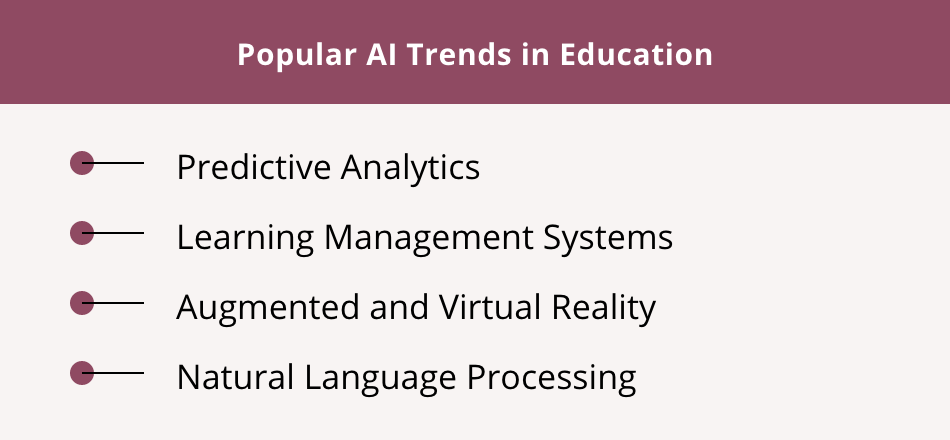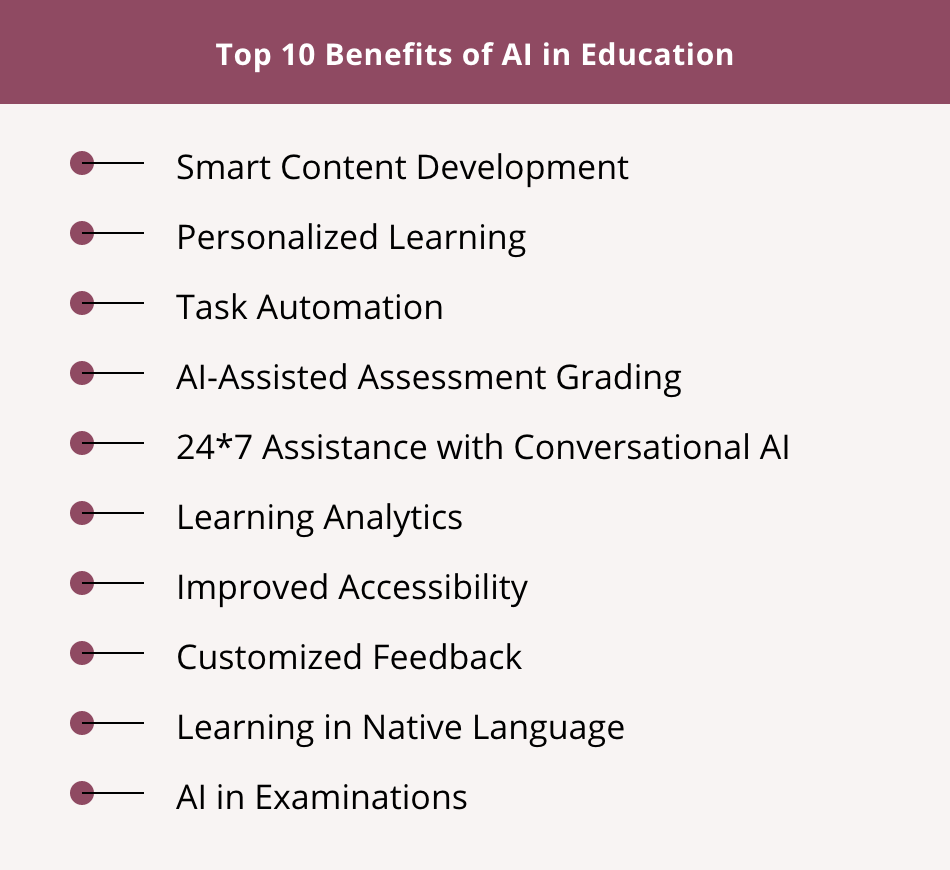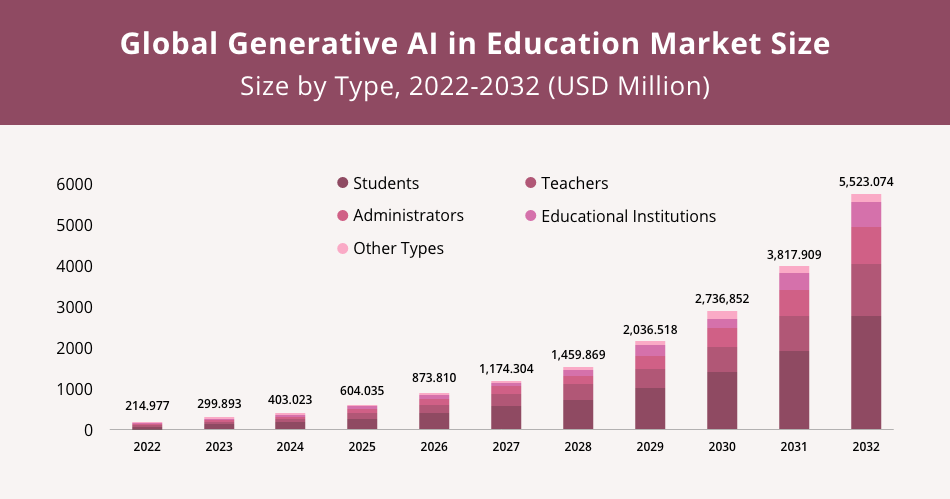The role of AI in education is significantly increasing, with over 64% of educational institutions leveraging this technology as a catalyst for business continuity.
Updated 14 August 2024

CTO at Appventurez
The educational industry has come a long way, especially with new technologies and trends transforming the learning domain. Advanced tech solutions like AI, ML, and AR/VR helped develop a more intuitive approach to learning and teaching.
Due to this reason, the global education app development services market is booming at an unprecedented pace, with the valuation expected to reach $14 bn by 2030. Consequently, businesses in the ed-tech industry are extensively adopting AI in education to revolutionize the traditional methods of learning, capturing wide-ranging areas more than ever.

This blog highlights the ever-rising scope of artificial intelligence in education. By the end of this informative piece, you will get an understanding of:
AI facilitates new forms of interaction for students and educational institutions. When used systematically, this technology revolutionizes the education system with interactive and easily accessible learning opportunities. Here are some futuristic and top AI trends in education that organizations use to elevate their ed-tech business.

The role of predictive data analytics is prominent in almost every industry. Businesses collaborate with data analytics partners to create mobile apps and web software driven by data algorithms. This tech trend utilizes big data, statistical algorithms, and ML techniques to determine the probability of outcomes, specifically based on historical records.
In the education sector, the impact of predictive data analytics is significant for schools, colleges, and universities to analyze students’ learning behavior and improve their retention rate. When it comes to students, it can provide a track record of their performance which can be further analyzed for improvements.
Schools and other institutions look for efficient AI-powered tools to integrate learning management systems (LMS) for comprehensive and customized learning opportunities. These systems could be further incorporated with AI chatbots and virtual assistants to support trainers and enhance students’ engagement levels.
The overall number of LMS users is projected to reach 73.8 million by the end of 2024. Also, more than 85% of teachers are already using digital learning tools to help students with learning exercises.
The role of AR VR in education sector is undeniable. In times when comprehending a humongous amount of information seems daunting, augmented and virtual learning makes it quite attainable.
By combining AR VR app development services with AI algorithms, businesses can optimize the content and delivery approach based on students’ behavior.
Natural language processing (NLP) helps machines comprehend and transcribe human language. With AI-powered NLP services, one can expect more sophisticated and productive language learning tools. For example, NLP can transcribe audio to text, making lectures and spoken content easily accessible to students who prefer reading or need transcripts for review.
NLP-enabled solutions like chatbots and virtual assistants are better at interpreting students’ behavior, providing adaptive content and tailored learning support. In fact, technology-wise, NLP solutions were dominant in the AI in education market, holding 40% revenue share in the segment.
Artificial intelligence in education helps streamline cumbersome tasks and makes learning and teaching hassle-free for students and teachers, respectively. Below are the top 10 benefits of AI in education.

AI and ML in education help teachers, researchers, and content developers with creating fresh, relevant, and personalized learning materials. Some popular examples include:
One of the prominent examples of technology in education is a shift from traditional schooling to personalized learning. The progressive utilization of AI in education has helped learners figure out the optimal way to comprehend and study their curriculum.
Personalized education with artificial intelligence aims to tailor the learning experience of every student based on their unique needs. The ideal combination of AI and education focuses on these requirements by offering adaptive learning programs, AI-embedded games, etc.
Artificial intelligence in education facilitates task automation, streamlining the management and administration tasks and helping teachers focus more on the teaching part. These tasks include report maintenance, attendance tracking, and other administrative roles. It helps in making the learning environment more efficient and productive.
Assessment grading and examination evaluation are undoubtedly time-consuming tasks for teachers. However, AI- and ML-based algorithms can significantly help them grade more efficiently with little or no human intervention.
These algorithms analyze student work and cross-check it with the data fed to the AI models to provide automated feedback and grading. It frees the teachers’ time to focus more on designing informative and interactive curricula. One thing to note is that this automated practice is suitable and recommended for assessments with objective-type questions only.
One of the latest trends in the AI domain is productivity optimization with conversational AI assistance. Conversational AI in education utilizes virtual assistants and chatbots to help learners with their individual problems, promoting independent learning.
Today, more than 50% of educational institutions and universities prefer AI for assistance to ensure enhanced quality of education. Consequently, conversational AI will be beneficial for both students and teachers to a great extent.
AI-powered learning analytics help educational institutions collect, evaluate, and report data about learners and their level of understanding. These insightful analytics can significantly support course designers and instructors in analyzing data and optimizing courses in a way that learners do not abandon them.
Learning analytics can also be helpful for students to track their progress and performance while working on a course. The recommended feedback can then be used to overcome potential challenges and improve overall learning efficiency.
Another great benefit of artificial intelligence in education is improved accessibility of learning resources to a wide-ranging audience. In fact, a study revealed that almost 60% of educational institutions are allocating AI-ML-based learning material backed by advanced features and tools.
Besides, with AI technologies, it is now possible to teach visually or hearing-impaired individuals. Innovative solutions like presentation translators and screen readers offer real-time subtitles and enhanced descriptions for virtual lectures, becoming one of the greatest AI in education examples.
Along with automated grading and assessment evaluation, using AI in education can also help in providing customized feedback and suggestions for improvement.
Personalized feedback analysis aids students in understanding their weaknesses and recommending the best solutions to transform into their strengths. Moreover, it also assists students in writing answers with clarity and precision.
Schools and colleges promoting multilingual curricula (especially native languages) need staff and resources proficient in specific languages. By using AI in schools, instructors can help students understand the course in their native language.
NLP- and ML-powered systems provide real-time feedback on grammar, pronunciation, and vocabulary, making learning more effective and engaging.
AI-based software systems and devices can be used in examination halls to monitor and detect suspicious behavior. Development partners can integrate these monitoring solutions with computer vision technology to analyze the students’ behavior in real-time, alerting invigilators in case of any suspicious activities.
Several top brands and emerging companies have been using AI in education to develop top-drawer AI-powered Edtech solutions. Below are some popular use cases and applications of artificial intelligence for education.
More than 800,000 students across Japan, Korea, and Latin America have leveraged an AI-based voice tech tool to improve their English. Edwin, an AI-powered adaptive learning solution included test preparation courses and personalized opportunities for individuals seeking to learn foreign languages.
Emerged in 2011, Duolingo is another incredible application of AI in education that integrates a smart and interactive bot to interact with learners. The platform offers language learning tutorials for over 40 languages and is well-known for its AI-enabled gamified approach. According to a report, Duolingo boasts a monthly active user base of around 74 million.
One of the greatest platforms for online courses and certifications, Coursera, utilizes the power of AI to help its users recommend personalized lectures and educational programs. It provides learners with automated assessments and adaptive learning paths, offering progressive learning opportunities with tailored recommendations.
The role of AI in businesses across different verticals is undoubtedly significant and the education sector is no different. Educational institutions and organizations are leveraging AI-based chatbots and tutors to enhance the students’ learning experience.
Besides this, several entities are utilizing the power of AI and ML algorithms to identify the areas where students lack, thus providing them with targeted interventions and personalized understanding.
Moreover, with the advent of generative AI in education, enhanced ingenious tools can be built for educators. These tools are backed by AI creativity which improves the scope of innovation and understands students’ preferences better.

In 2023, the generative AI in the education market touched almost $300 million mark, and it is projected to increase at least by $100 million this year.
On top of that, many renowned universities have even started incorporating AI bots to teach their students. For instance, Harvard University has created and employed Gen AI-powered professors for its computer science courses. The university claims that these AI bots can help students learn at their own pace and get individualized attention and support that works best for them.
All these stats and emerging trends show that the future of AI in education is bright and promising.
The impact of AI on education is consistently increasing, and our professional AI consultants can significantly help you with its flawless implementation into your solution.
We, at Appventurez, hold a profound expertise in creating educational apps integrated with advanced technologies. As seasoned professionals in app development, our experts combine AI development services with their proficiency in ed-tech to craft e-learning solutions, bringing maximized ROI and increased engagement.
Besides, our software development company is also well-versed in delivering many other seamlessly integrated services for AI in education, such as:
So, what are you waiting for? Let’s transform the educational space with AI-powered systems and revolutionize the way we teach and learn.
Q. How is AI used in education to enhance the learning experience?
There are several uses of AI in education sector, ranging from streamlining administration and instructing tasks for teachers in schools to assisting students in learning faster, better, and more effectively. To be precise, here’s how AI is used in education: * Task automation and management * Smart content creation for learning resources * Personalized learning with tailored feedback * All-day-long assistance with conversational AI * Identification of classroom vulnerabilities
Q. How will AI affect education on a larger scale?
With the continuous integration of AI in education, institutions can easily evaluate students' data, such as their strengths and weaknesses, learning preferences, etc. This data can be further analyzed to create customized learning solutions for students. Besides, AI can also complement the capabilities of educators, enhancing their skills and fostering creativity in teaching.
Q. What are the challenges associated with AI in education?
The impact of AI on education is immense, especially due to the potential benefits it provides to schools, teachers, students, and their parents. However, along with these great advantages of AI in education, there are a few challenges, too, that the education community needs to address: * Students can use AI in schools and colleges to complete their assignments * AI systems can provide biased results if the data fed to them is bias * Security and privacy concerns * Overreliance on technology can negatively impact the individual’s creativity
Q. What is the future of education technology after the introduction of new trends in Ed-tech?
Schools and ed-tech institutions use strategies like gamified education, cohort learning, and advanced personalized training to enhance the scope of education. Besides, the use of AI in Edtech can further improve the educational landscape by offering tailored learning solutions. All these trends show that the future of technology in education is undoubtedly bright and holds great opportunities for learners.


Elevate your journey and empower your choices with our insightful guidance.

CTO at Appventurez
CTO and Co-Founder at Appventurez, Sitaram Sharma has 10+ years of experience in providing world-class digital solutions. As a CTO, he brought his expertise ranging from product enhancements to advanced technological integrations, while focusing on the consistent growth of the team.
You’re just one step away from turning your idea into a global product.
Everything begins with a simple conversation.